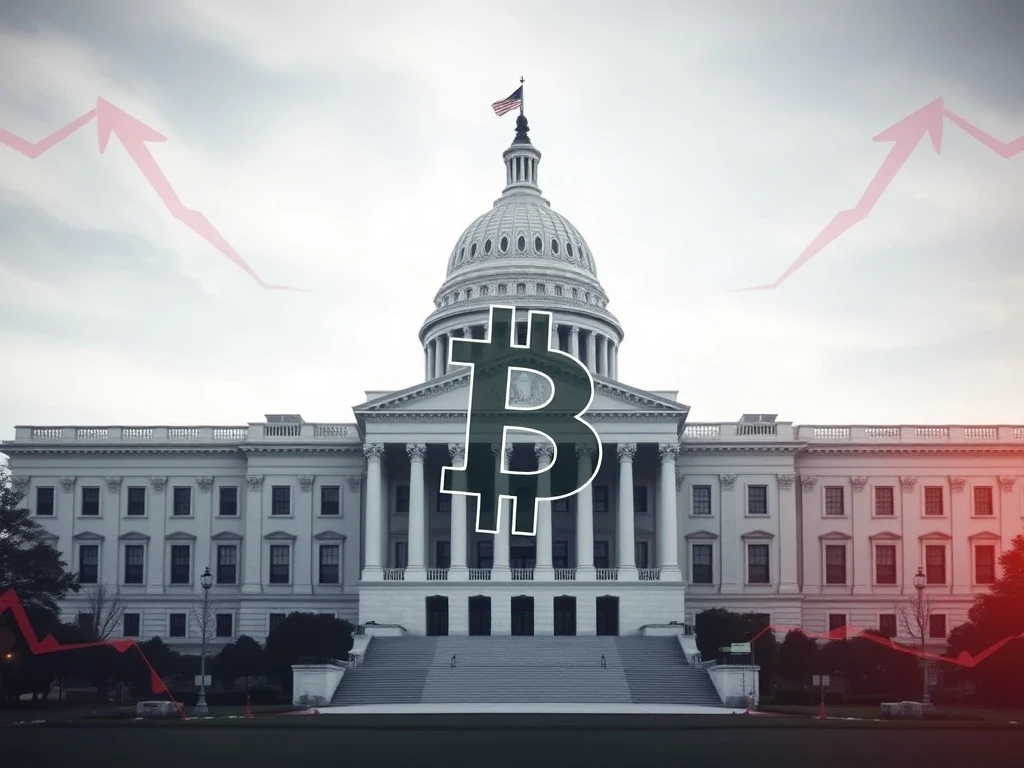Bitcoin Surge: US Commerce Official’s Bold Investments Amid Trump Tariffs

In an unexpected turn, a high-ranking US Commerce official‘s firm has made significant investments in Bitcoin funds. This move comes as former President Donald Trump’s unpredictable trade tariffs continue to reshape global markets. The revelation raises questions about the intersection of government policy and personal financial gain. For cryptocurrency enthusiasts and market observers, this development offers a fascinating glimpse into elite investment strategies during turbulent economic times.
US Commerce Official’s Bitcoin Investment Revealed
Recent filings with the Securities and Exchange Commission (SEC) highlight a notable trend. US Secretary of Commerce Howard Lutnick, through his family-controlled firm, Cantor Fitzgerald, has actively engaged in various investments. These include sectors directly affected by Trump’s economic policies. Interestingly, Cantor Fitzgerald also invested in Bitcoin funds.
Specifically, an August 14 SEC filing, analyzed by Quiver Quantitative, showed Cantor Fitzgerald invested in a Fidelity Wise Origin Bitcoin Fund (FTBC). They also acquired stock in companies like chip producer AMD, Tesla, Alibaba, and Robinhood. Cantor’s investments in FTBC totaled $120.7 million. Their stake in trading platform Robinhood reached $116.8 million.
This substantial Bitcoin investment by a firm linked to a senior administration official draws considerable attention. It suggests a growing acceptance of digital assets within traditional finance circles. Furthermore, it hints at strategic positioning against economic uncertainties.
Navigating the Storm: Trump Tariffs and Market Volatility
The Trump administration’s trade policies have created an unpredictable environment. On Tuesday, the administration extended its tariff delay on China. However, the United States Commerce Department simultaneously announced new aluminum tariffs. These affect over 400 different products. This list includes wind turbines, mobile cranes, railcars, motorcycles, and construction equipment.
The constant shifts in Trump tariffs cause widespread concern. National trade groups, like the National Foreign Trade Council (NFTC), voice their apprehension. They state these policies are “delaying growth, disrupting operations, and raising legal concerns among companies.” Such unpredictability compels investors to seek alternative assets. Bitcoin often serves as a hedge against traditional market instability. Therefore, the timing of Cantor Fitzgerald’s crypto investment is noteworthy.
Examining Potential Conflicts of Interest
US law contains provisions designed to prevent conflicts of interest. However, Secretary Lutnick received a waiver on July 8. This waiver permits him to participate “in particular matters … that may have a direct and predictable effect on Cantor Fitzgerald.” This exemption raises eyebrows among watchdog groups.
Bartlett Naylor, a financial policy advocate at Public Citizen, commented on the situation. He told Sludge, “When the Oxford English Dictionary next updates its conflict-of-interest definition, it’ll use Cantor Fitzgerald’s crypto ventures and the Lutnick connection as prime example.” This highlights the perceived ethical dilemma. The waiver allows an official to make decisions that could directly benefit their private firm. This scenario exemplifies a classic conflict of interest.
Other members of Trump’s inner circle have also faced similar scrutiny. David Sacks, the administration’s crypto and AI Czar, reportedly sold $200 million in crypto investments. This occurred at the start of Trump’s second term to avoid such claims. Yet, Sacks also received a waiver. It stated that his financial interests were “not so substantial as to be deemed likely to affect the integrity of your services to the Government.” His venture capital firm, Craft Ventures, later invested $22 million in AI firm Vultron, which seeks federal contracts. This further complicates the narrative surrounding official conduct and private investments.
The Strategic Bitcoin Reserve Concept
The idea of a government-backed Strategic Bitcoin Reserve has gained traction. Bo Hines, executive director of the Presidential Council of Advisers on Digital Assets, floated this concept. Following a White House interview in April, Hines suggested using tariff surpluses to fund such a reserve. This proposal aims to bolster national digital asset holdings. It also provides an alternative use for funds generated by trade duties.
Cantor Fitzgerald’s significant investment in a Bitcoin fund aligns with this forward-thinking perspective. It indicates that some influential figures might view Bitcoin as a strategic asset. This aligns with broader discussions about national digital asset strategies. Analysts suggest Cantor’s other investments, like Alibaba, resist tariff policies. Tesla, conversely, might directly benefit from tariffs. This diverse portfolio strategy reflects a complex understanding of the current economic landscape.
Broader Economic Impacts of Tariffs
US Treasury Secretary Scott Bessent recently commented on the ongoing tariff situation. He stated that the status quo of 90-day delays with China was “working pretty well.” Bessent projected tariffs would bring in $300 billion in revenue. He believes this will help reduce the deficit and pay down debt. This revenue could then offset costs for American citizens.
However, trade groups present a less optimistic outlook. The NFTC warns of “broad potential impacts on supply chains.” They argue that tariffs create uncertainty and increase raw material costs. This affects various industries. “In sectors like advanced manufacturing, the stakes are particularly high,” the NFTC stated. “Four in five companies said tariffs threaten their ability to innovate.” This impacts areas crucial to competitiveness, including fuel efficiency and safety.
Tariffs do not just affect large corporations. They also impact everyday consumers. A Yale University Budget Lab report noted a significant increase in prices. “The price level from all 2025 tariffs rises by 1.8% in the short-run,” the report stated. This equates to an average per household income loss of $2,400 in 2025. For example, tariffs on imported food have caused domestic produce prices to jump. In July, wholesale prices for domestic fresh and dry vegetables were 38.9% higher year-over-year. Home Depot also reported homeowners delaying large projects due to increased prices from tariffs. The company aims to diversify its supply chain to mitigate these effects. The full impact of Trump’s unpredictable trade policy remains to be seen. Yet, some administration members appear prepared to leverage this uncertainty for personal gain.








